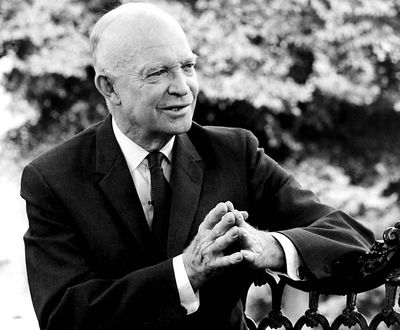This column reflects the opinion of the writer. Learn about the differences between a news story and an opinion column.
Commentary: Dwight Eisenhower created a unifying brand of politics that the GOP needs today

During his first term as president, Dwight Eisenhower turned to his press secretary, Jim Hagerty, and said, “If the right wing wants a fight, they’re going to get it. If they want to leave the Republican Party and form a third party, that’s their business, but before I end up, either this Republican Party will reflect progressivism, or I won’t be there with them anymore.”
Eisenhower wrote in his diary that he might even have to form a third party himself, and he would dedicate it to “the Middle Way” – his term for the political centrism that he favored. This could be a potent theme for today’s Republican Party after next year.
Third parties in American history have come and gone. Our current two-party system was born when another system failed. The Republican Party began in 1854 when renegades from two other parties – the Democrats and Whigs – joined together. A pithy term had been making the rounds among Democrats who decided their party was hopeless: They were called “barn burners.” They were ready to burn down the barn because the party problems they saw were deemed too pervasive to fix.
Something similar may start among Republican moderates by 2025 if they believe their party is hopeless: They may contemplate starting over. And Ike would probably urge them to do it.
In the 1950s, Ike didn’t need to. He found a way to create a brand of politics so unifying that Democrats and Republicans came to love him. He succeeded spectacularly in uniting a divided nation.
How did he do it? As president, Eisenhower created visionary programs to keep the American people prosperous, safe and free for decades: the Interstate Highway System, for example, and space-based surveillance. The latter program was, of course, top secret.
With civil rights, his method was incremental, but firm, to keep the nation calm. Eisenhower nominated Earl Warren to be chief justice of the Supreme Court knowing that he supported integration. He was not afraid to enforce the rule of law when he ordered the 101st Airborne Division into Little Rock, Arkansas, to ensure the safety of the “Little Rock Nine” and uphold the rulings of the Supreme Court.
Later on, scholars would call him the “hidden hand” president. Today’s MAGA Republicans would probably view him as an incarnation of the “deep state.”
When the Dwight D. Eisenhower Memorial in Washington was dedicated in summer 2020, Republican President Donald Trump was fomenting the kind of social unrest that Eisenhower loathed. Never did the Eisenhower legacy seem so remote.
For the past few years, Republican moderates have writhed as the far-right “base” maintains its hold in Republican primaries. Former U.S. Rep. Liz Cheney supported some national security-focused Democrats after the radicalized “base” in Wyoming ousted her. While Cheney disavows a third-party candidacy in 2024, she is keeping her options open after that. Former Illinois U.S. Rep. Adam Kinzinger has expressed similar sentiments.
Trumpism significantly reduced Republican electoral gains in the 2022 midterms, and presidential candidate Chris Christie warns that an electoral catastrophe for Republicans might occur in 2024. If a Democratic landslide does occur, constructive Republicans will have a “time for choosing.”
Currently, their party is on the way to nominating for the presidency an individual charged with numerous felonies. The prospect of such a Republican presidential candidacy would have been unthinkable 10 years ago. It is now the new normal.
Even if Trump is convicted of crimes before the 2024 election, the Republicans may still nominate him. The MAGA base is unappeasable: Followers’ lust to divide our society for the fun of it and make rational governance impossible shows no signs of diminishing.
Is it time for constructive, policy-focused Republicans who don’t view their office as a performative platform to quit the party and do something drastically different? Not yet. Many commentators have warned that one or more third-party candidacies in 2024 could play into Trump’s hands.
A fusion group called No Labels – which includes Republicans such as former Maryland Gov. Larry Hogan – has drawn criticism for its plans to run a “unity ticket” in 2024. And lifelong Republicans are reluctant to give the Democrats a free ride by breaking the GOP wide open.
But perhaps it will be time, in the event of a Republican debacle, to give the new barn burners their day. There may be scores of Republican and Democratic moderates who would be interested in working together in a new fusion party, a catalytic party that would usher in a different party system.
A three-party system, at least for a while, might do the nation good in these very strange times. Creating a new dynamic to give pragmatists a basis for power brokerage by mobilizing huge coalitions of people who are tired of a divisive, negative approach to politics might be worth trying after 2024.
Is there any doubt about what Eisenhower would say?
Richard Striner is the author of a new biography about Dwight Eisenhower, “Ike in Love and War: How Dwight D. Eisenhower Sacrificed Himself to Keep the Peace,” which will be released Sept. 12. Striner was an adviser to the Eisenhower Memorial Commission.